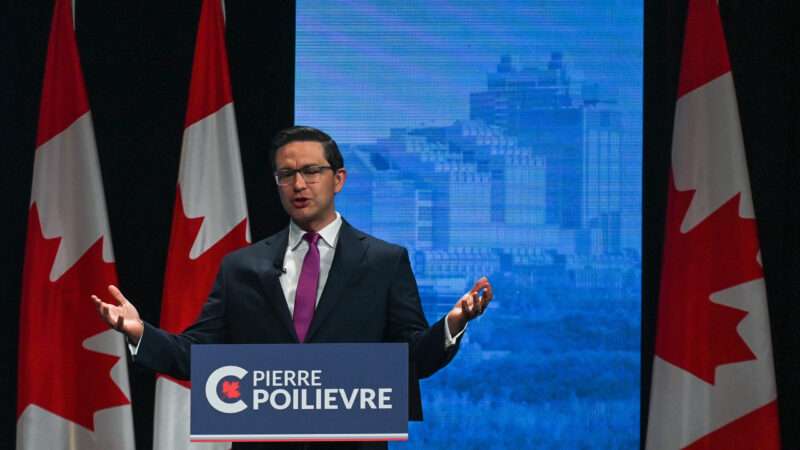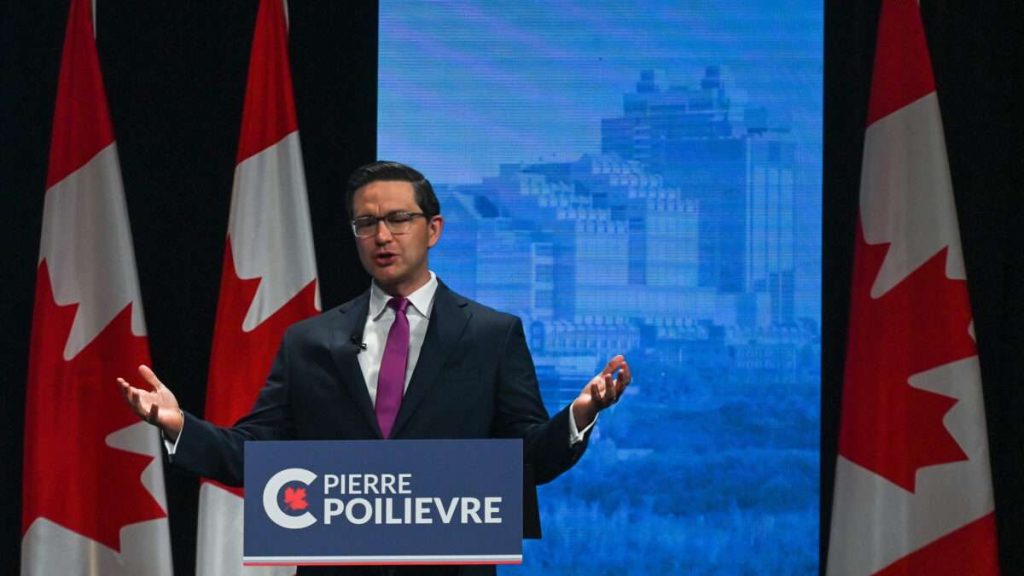
Justin Trudeau announced his resignation as Canadian prime minister on Monday, ending his nine-year tenure amid cratering support from voters and his own Liberal Party. During a Monday speech, Trudeau said he plans to remain in office until the Liberal Party selects a new leader. Canada’s next federal election must take place by October.
Pierre Poilievre, the leader of Canada’s Conservative Party, is the current front-runner to replace Trudeau as prime minister. Throughout 2024, polls showed Poilievre and the Conservative Party routing Trudeau and the Liberal Party as economic discontent grew and political issues (including the deputy prime minister’s surprise resignation last year) rocked the incumbent government.
In a video posted to X after Trudeau’s resignation on Monday, Poilievre painted his Conservative Party as the “common sense” antidote to Canada’s recent woes. “We’ll cap spending, axe taxes, reward work, build homes, uphold family, stop crime, secure borders, rearm our forces, restore our freedom, and put Canada first,” he explained, “to bring home Canada’s promise.”
Beyond bite-sized slogans, what policies would Poilievre bring to the table as Canada’s prime minister?
First elected to Canada’s Parliament in 2004, Poilievre served as a senior cabinet minister under former Prime Minister Stephen Harper. He garnered attention in 2022 due to his support for the Canadian truck drivers who took to Ottawa to protest Trudeau-era COVID-19 vaccine mandates. In the years since, the firebrand Conservative has frequently railed against Trudeau and his government. He argued in a recent interview with psychologist Jordan Peterson that Canadians are “sick and tired” of the “horrendous, utopian wokeism” that benefits “egotistical personalities on top” rather than “common people.”
Variously described as “libertarian” and “populist,” Poilievre supports cutting government spending and lowering taxes. “We will cap government spending with a dollar-for-dollar law that requires we find one dollar of savings for every new dollar of spending,” he argued in a September speech in Canada’s House of Commons. Poilievre has said his government would remove the federal sales tax on homes under $1 million. Last June, he came out against a proposed capital gains tax increase and promised to form a “tax reform task force” soon after forming a government if elected. He owns and uses bitcoin and promotes cryptocurrencies as a hedge against inflation.
Inflation is immoral, Poilievre told Peterson, because “nobody votes on it.” Rather, “inflation is adopted secretly, and you blame the grocer because groceries are more expensive or your local gas station because gas is more [expensive]…when in fact it was actually the government that bid up all of those things with money printing, and you didn’t even know about it.”
“What we have to do is stop growing the money supply and start growing the stuff money buys,” he continued. “Produce more energy, grow more food, build more homes. We have to unleash the free enterprise system.”
Poilievre is a fierce critic of Canada’s carbon tax, calling it “an existential threat to our economy and our way of life.” He has said “he plans to speed up approvals to build oil refineries, liquefied natural gas plants, nuclear facilities and hydro power,” reported Bloomberg last week.
During a 2022 roundtable, Poilievre argued that immigrants and Conservatives shared the same values—”hard work, family, freedom, tradition”—and that those values were needed “to build a future Conservative party.” More recently, he has pushed for tougher border security and tighter restrictions on asylum seekers. A Conservative government, Poilievre suggested, would set immigration levels below the rate of homebuilding.
Of course, a major question is how the U.S. and Canada, both helmed by new leaders, will interact. If elected, Poilievre is likely to have some points of friction with President-elect Donald Trump. Trump has promised to impose steep tariffs on Canada after he returns to the White House. “Canada is ripping itself off” by selling oil and gas to the U.S. at “enormous discounts,” Poilievre told Peterson. The U.S.-Canada relationship reached a new (and very strange) level recently when Trump suggested that he might use “economic force” to acquire America’s northern neighbor.
“Canada will never be the 51st state,” Poilievre posted to X on Tuesday. “We will put Canada First.”
For all his liberty-friendly tendencies, certain aspects of Poilievre’s plans—immigration restrictions and a proposed crackdown on crime, to name a few—might involve uncomfortable extensions of state power. Some may question his anti-establishment bona fides given that he is a career politician. Still, after Trudeau’s nearly decade-long tenure, Poilievre offers some refreshing ideas—and he might just get the chance to put them into action.
The post Meet Pierre Poilievre, the Front-Runner To Be Canada’s Next Prime Minister appeared first on Reason.com.







